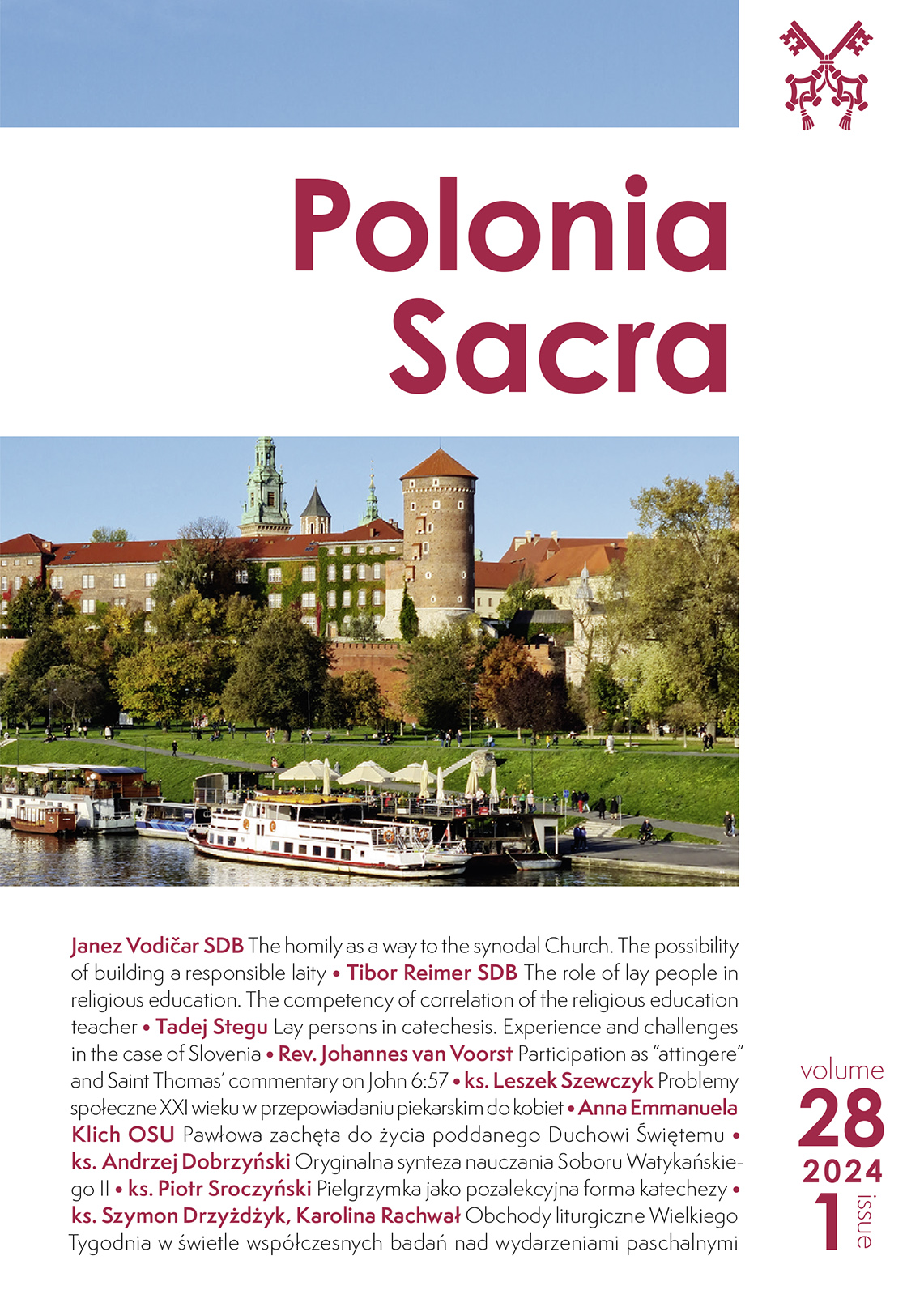Lay persons in catechesis. Experience and challenges in the case of Slovenia
DOI:
https://doi.org/10.15633/ps.28103Keywords:
religious education, catechesis, kerygma, lay personsAbstract
Unlike in most other countries, religious education did not return to public schools in Slovenia after the fall of communism. The Catholic Church intensively introduced and developed catechesis in parishes. The new Slovenian Catechetical Plan opens the door to consider the various forms of catechesis already taking place in parish communities and to a lifelong model of catechesis that is not confined to the period of childhood and adolescence. The article analyses the development of the field of catechesis in Slovenia and the role of lay catechists. It highlights the main trends and challenges in catechesis and some of the existing solutions that no longer look only at the age of candidates but take into account their maturity and readiness when preparing to receive the sacraments of initiation. The analytical research is further illuminated by the author’s personal experience as a layperson involved in catechesis.
References
Burger M., What is the Slovenian catechetical plan (SKN), “Church Today” 52 (2018), p. 9–12.
Burger M., Rebec S., Zelič B., Zorec F., Česen A., Gerjolj S., Stegu T., Šegula A., Slovenian catechetical plan, Celje 2018.
Cavalletti S., Catechesis of the Good Shepherd: essential points, Ljubljana 2017.
Feiner F., Empowerment zu Priestly Wirken kraft der Taufe — Jesu Ermächtigung zum Leben und Handeln aus dem Glauben, in: For we know that you are chosen! From clericalization to synodality in pastoral care and catechesis, ed. by J. Vodičar, Ljubljana 2022, p. 123–134.
Francis, Antiquum ministry, https://www.vatican.va/content/francesco/en/motu_proprio/documents/papa-francesco-motu-proprio-20210510_antiquum-ministerium.html (18.08.2023).
Neuhold H., Glaubenskommunikation statt Belehrung and Indoctrination — eine neue Kommunikationskultur auf dem Hintergrund der gemeinsamen Taufe und des gemeinschaften Priestertums, in: For we know that you are chosen! From clericalization to synodality in pastoral care and catechesis, ed. by J. Vodičar, Ljubljana 2022, p. 123–134.
Nežič Glavica I., Family — the “hidden” potential of the Church, in: We know that you are chosen! From clericalization to synodality in pastoral care and catechesis, ed. by J. Vodičar, Ljubljana 2022, p. 49–58.
Podjavoršek N., What is family catechesis, https://natalijapodjavorsek.splet.arnes.si/ (26.02.2022).
Pontificio Consiglio per la Promozione della Nuova Evangelizzazione, Direttorio per la catechesi, Città del Vaticano 2020.
Slovenian Bishops’ conference, Come and see, Slovenian pastoral plan (umbrella document), Ljubljana 2012.
Stegu T., Adult catechesis in Slovenia: the most widespread forms of adult catechesis, “Church Today” 54 (2020), p. 22–25.
Stegu T., Evangelization of movements and new communities, in: We know that you are chosen! From clericalization to synodality in pastoral care and catechesis, ed. by J. Vodičar, Ljubljana 2022, p. 97–104.
Šegula A., New directory for catechesis in the context of Slovenian catechetical practice, in: New directory for catechesis. Challenges catechesis and pastoral care today, eds. M. Mohorič, M. O. Llanos, Zadar 2023, p. 429–442.
Šegula A., A best practice example of new evangelization with an emphasis on declericalization, in: We know that you are chosen! From clericalization to synodality in pastoral care and catechesis, ed. by J. Vodičar, Ljubljana 2022, p. 89–96.
Turnšek M., Planning in catechesis (pastoral ministry) is the challenge of life, “Church Today” 52 (2018), p. 4–7.
Zorec F., What is good does not need to be changed, “Church Today” 52 (2018), p. 16–20.
Downloads
Published
Issue
Section
License
Copyright (c) 2024 Tadej Stegu

This work is licensed under a Creative Commons Attribution 4.0 International License.
Authors who publish in this journal agree to the following terms:
- Authors retain the copyright and full publishing rights without restrictions and grant the journal right of first publication with the work simultaneously licensed under a Creative Commons Attribution 4.0 International License that allows others to share the work with an acknowledgement of the work's authorship and initial publication in this journal.
- Authors are able to enter into separate, additional contractual arrangements for the non-exclusive distribution of the journal's published version of the work (e.g., post it to an institutional repository or publish it in a book), with an acknowledgement of its initial publication in this journal.
- Authors are permitted and encouraged to post their work online (e.g., in institutional repositories or on their website) prior to and during the submission process, as this can lead to productive exchanges, as well as earlier and greater citation of published work (See The Effect of Open Access).

